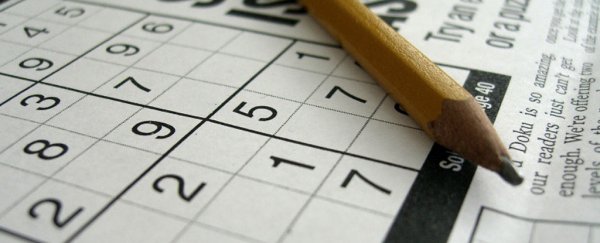It's fair to say that people are pretty much divided when it comes to the 'brain game' Sudoku. Some love it, others find it maddening, and many a fan of crosswords (particularly those of the cryptic variety) criticise its structure for being overly repetitive once you understand the basic tropes.
But regardless of the range of responses Sudoku provokes, it's unlikely that it's ever created this kind of a reaction before. A new study documents the rare case of a 25-year-old man who experiences clonic seizures (rapid contractions of muscles) in his left arm when trying to play the famous number game.
In this instance, his reaction stems from previous trauma. The former physical education student was once buried in an avalanche during a ski holiday, which resulted in him experiencing a significant period of oxygen deficiency (hypoxia).
After the incident, the man developed involuntary twitching (called involuntary myoclonic jerking) in the muscles of his mouth and legs, which happened at times when he tried to talk or walk.
However, the most unusual complication stemming from the oxygen deficiency presented itself several weeks later, while he was rehabilitating. "He was in the rehabilitation clinic, and he was bored, so he started doing Sudokus," said neurologist Berend Feddersen from the University of Munich in Germany, as reported by Mandy Oaklander at Time.
Playing the number game induced spasmodic jerking in the man's left arm (you can see a short video of what it looks like here), but the seizures stopped as soon he put away the Sudoku puzzle.
According to the researchers, the man's clonic seizures brought about by Sudoku are a form of reflex epilepsy, which can be triggered by external stimuli such as light, sound, hot water, or certain activities such as reading, playing games, or calculating mathematics. In this instance, none of those things triggered seizures for the man, but playing Sudoku did – and especially his particular method for figuring out the number puzzles.
"When he solves Sudoku, one of his strategies is to arrange the numbers in some 3D manner," said Feddersen, hypothesising that something about this kind of spatial visualisation is what triggered the man's episodes. "That's very interesting, because when I do Sudoku, I just make trial and error."
The researchers used functional magnetic resonance imaging (fMRI) to examine the man's brain and found higher-than-normal levels of activity in the man's right central parietal cortex, which helps us calculate spatial sense and navigation. Diffusion tensor imaging (DTI) also revealed that brain damage stemming from the oxygen deprivation had made the man lose almost all of his U-fibres in this part of the brain, which help control inhibition.
"When these kinds of neurons are dying, then you have not enough inhibition, so a loss of U-fibres leads to an overactivation," said Feddersen.
Fortunately for the man in question, he stopped playing Sudoku (quite understandably) and has been seizure-free for over five years. "For him," said Feddersen, "luckily it was this kind of Sudoku thing which was the activation, and not another one he does in his daily life."
The research is published in JAMA Neurology.
